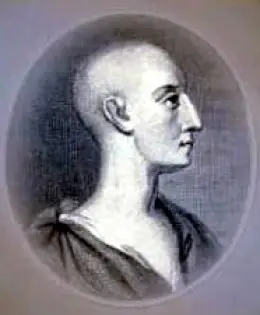Childish and weakly sentimental.
Namby-pamby
What's the meaning of the phrase 'Namby-pamby'?
What's the origin of the phrase 'Namby-pamby'?
The phrase ‘namby-pamby’ was a nickname given to the English poet and playwright, Ambrose Philips (1674 – 1749).
In 1714, Philips became tutor to George I’s grandchildren. The position gave him a status amongst the aristocracy and he took the opportunity to advance his place in society by writing sycophantic sentimental poems in praise of their children. These were written in rather affected and insipid nursery language, of the ‘eency-weency’, ‘goody-goody’ sort. This didn’t go down well with his rival poets and playwrights and when, in 1725, he wrote the execrable ‘To the Honourable Miss Carteret‘, he was widely derided:
Thou, thy parents pride and care,
Fairest offspring of the fair
…
When again the lambkins play,
Pretty sportlings, full of May
and so on…
His contemporaries Henry Carey, John Gay, Alexander Pope and Jonathan Swift combined the cloying nursery reduplication in Philips’ work with his first name and came up with a nickname for him – Namby-Pamby. Carey was the first to put it into print, in the poem Namby-Pamby, circa 1725:
All ye poets of the age,
All ye witlings of the stage …
Namby-Pamby is your guide,
Albion’s joy, Hibernia’s pride.
Namby-Pamby, pilly-p***,
Rhimy-pim’d on Missy Miss
Tartaretta Tartaree
From the navel to the knee;
That her father’s gracy grace
Might give him a placy place.
Pope subsequently made similar fun of Philips in his poem The Dunciad – “Beneath his reign, shall … Namby Pamby be prefer’d for Wit!”
The term began to be used to describe a style of ineffectual writing soon afterwards; for example, William Ayre, in his Memoirs of the life and writings of Alexander Pope, 1745, writes:
“He [Philips] us’d to write Verses on Infants, in a strange Stile, which Dean [Jonathan] Swift calls the Namby Pamby Stile.”
It wasn’t long before the direct insult to Philips became a new form of general disparagement and ‘namby-pamby’ entered the language to refer to anything weak or ineffectual; for example, The Westmoreland Magazine, 1774, refers to “A namby-pamby Duke”.
Philips wasn’t amongst the first rank of English poets, but some believe the fact that his only lasting contribution to the language as the butt of the disparaging ‘namby-pamby’ is rather unfair. He was socially unpopular and remained unmarried, poignantly referring in print to ‘a broken love-promise’, and his unattractive appearance (“of lean make and pale complexion and five feet seven inches high” – Joseph Spence) made him an easy target. However, no less a champion than Samuel Johnson came to his rescue in asserting that “Philips became ridiculous, without his own fault”.
Perhaps a kinder epitaph is that ‘namby-pamby’ was clearly the inspiration for the name of the children’s television character, Andy Pandy. The puppet was featured in the classic series Watch With Mother, which was amongst the first television programmes made for children and a mainstay of BBC output in the 1950s.
The legacy lived on beyond Andy Pandy. In the 1960s the British comic Des O-Connor parodied the puppet in his TV shows as Dandy Sandy.
What the American audience, who had never heard of Andy Pandy, made of it I can only imagine. Especialy as there was a US cartoon character called Andy Panda and a Jimmy Durante song about Sandy Koufax called Dandy Sandy.
See other reduplicated phrases.
The history of “Namby – pamby” in printed materials
Trend of namby – pamby in printed material over time
Related phrases and meanings
Browse more Phrases
About the Author

Phrases & Meanings
A-Z
A B C D E F G H I J K L M N O P Q R S T UV W XYZ
Categories
American Animals Australian Bible Body Colour Conflict Death Devil Dogs Emotions Euphemism Family Fashion Food French Horses ‘Jack’ Luck Money Military Music Names Nature Nautical Numbers Politics Religion Shakespeare Stupidity Entertainment Weather Women Work
How did we do?
Have you spotted something that needs updated on this page? We review all feedback we receive to ensure that we provide the most accurate and up to date information on phrases.
